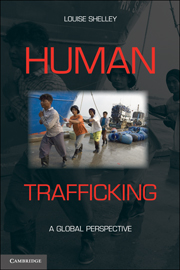Book contents
4 - The Business of Human Trafficking
Published online by Cambridge University Press: 05 June 2012
Summary
Organized crime, like all businesses, is focused on making a profit, ensuring supply, and meeting demand. What sets an organized crime business apart is that violence and corruption are innate to its business operations. As the previous chapter has shown, human trafficking is very much part of organized crime because the criminals who traffic people rely on coercion, deception, corruption, and brute force at every stage of the business. Human trafficking businesses worldwide share these common features.
Yet analyses of international business and trade reveal that there are great variations in the business practices of entrepreneurs in different regions of the world. This helps explain great differences in trade data and in economic rates of growth. For example, the Chinese have focused on trade to foster development. In the worldwide recession that started in 2008, China experienced a decline in growth but not a national economic meltdown. Rather, the Chinese were among the first to show signs of recovery from the global economic crisis. In contrast, Russia and some other post-Soviet states experienced significant economic growth after the year 2000 as a consequence of the rise in prices for the sale of natural resources such as oil and gas that provided the core of their economy.
- Type
- Chapter
- Information
- Human TraffickingA Global Perspective, pp. 112 - 138Publisher: Cambridge University PressPrint publication year: 2010



